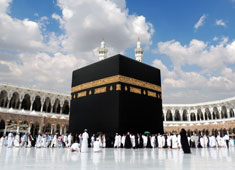Fatwas On Ihram
Fatwas On Ihram

- Forgetfulness
Question: A pilgrim assumed Ihram for Umrah/Hajj and he/she has a habit of playing with his/her hair while he/she is thinking. He/she did that forgetfully while he/she was in Ihram and some of his/her hair came out. Does he/she have to offer expiation?
Answer: There is nothing due on him/her due to Allah’s statement concerning the believers, that they said: “Our lord, do not take us to account (i.e., punish us) if we forget or unintentionally err.” (Qur’an, 2:286). Indeed Allah responded to their du’aa, for it is authenticated from the Messenger of Allah (peaceand blessings of Allah be upon him) that Allah said: “Indeed I have done so (i.e., accepted this du’a).” (Sahih Muslim, no. 126)
Sheikh Abdul Aziz Bin Baz; Fatawa
Islamiyah, vol. 4, pg. no. 139
- Hajj for parents
Question: Our parents died and they did not perform the obligation of Hajj, nor did they leave a will concerning it. Should we perform Hajj for them and how is that done?
Answer: If they were well-off in their lives and they were able to perform Hajj with their wealth, you are obliged to perform Hajj for them from their wealth. If you perform Hajj for them with wealth other than theirs as an act of charity on your part, then you will be rewarded for that. However, if they were in difficult circumstances (i.e poor) you do not have to perform it for them. Or if one of them was poor, you do not have to perform Hajj on behalf of the one who was poor. However, if you want to be generous and perform Hajj for them, you will receive a great reward and that is a form of kindness toward parents.
Sheikh Abdul Aziz Bin Baz; Fatawa
Islamiyah, vol. 4, pg. 68
- Assuming Ihram on the day of Tarwiyah
Question: From where does the Hajj pilgrim assume Ihram on the day of Tarwiyah?
Answer: He/she assumes Ihram from his/her place just as the Companions of the Prophet (peace and blessings of Allah be upon him) assumed Ihram from their places in Al-Abtah during the Farewell Hajj, as per the order of the Prophet (peace and blessings of Allah be upon him). Equally, whoever is inside Mecca, he/she assumes Ihram from his/her place. This is due to the Hadith of Ibn Abbas (may Allah be pleased with him), which contains the Prophet’s statement: “And whoever is within that – meaning within the boundaries of the Mawaqit – then his/her place of assuming Ihram is from his/her people (i.e., his/her home). Even the people of Mecca assume Ihram from Mecca. (Al-Bukhari, no. 1526, and Sahih Muslim, no. 1181)
Sheikh Abdul Aziz Bin Baz; Fatawa
Islamiyah, vol. 4, pg. no. 120
- Menses while in Ihram
Question: If a woman gets her menses or has postnatal bleeding after assuming her Ihram ,is it correct for her to perform Tawaf around the Ka’abah? What should she do? Does she have to performthe Farewell Tawaf (Tawaful-Wada)?
Answer: If she has postnatal bleeding or gets her menses when she arrives for Umrah, she refrains from that (Tawaf) until she performs Ghusl. Then when she cleans herself, she performs Tawaf and Sa’ai, cuts her hair and completes her Umrah. If this occurred after the Umrah or after she assumed Ihram for Hajj on 8th day (of Dhul-Hijjah), then she does the acts of Hajj, such as standing at Arafat, staying in Muzdalifah, stoning the pillars and other things as well, such as saying the Talbiyah and doing Dhikr of Allah. Then, when she becomes physically clean, she performs Tawaf and Sa’ai for Haj. If she gets her menses after the Tawaf and the Sa’ai and before the Farewell Tawaf, she is not required to perform the Farewell Tawaf, because it is not compulsory for the menstruating woman and the woman with postnatal bleeding to perform the Farewell Tawaf.
Sheikh Abdul Aziz
Bin Baz; Fatawa Islamiyah, vol. 4, pg. no. 153
- Changing the garments of Ihram
Question: Is it permissible to change the garments of Ihram in order to wash them?
Answer: There is no harm in washing the Ihram garments and there is no harm in changing them and using other Ihram garments that are new or washed.
Sheikh Abdul Aziz Bin Baz; Fatawa
Islamiyah, vol. 4, pg. no. 128
- Ihram in airplane
Question: A man wanted to perform Hajj or Umrah and put on the Ihram clothing on the airplane, but he did not know the place of the Meeqat. So should he have delayed entering the state of Ihram till he reached Jeddah?
Answer: If he intended the Hajj or Umrah (while arriving) by air, then he should take bath in his home and wear the Izaar and Ridaa (Ihram clothing), if he wishes. If there is only a little time before approaching the Meeqat, he should enter the state of Ihram according to what he intends, Hajj or Umrah, so there is no difficulty in this.
If he does not know about the Meeqat, he should ask the pilot or one of the hostesses or a passenger who knows about this.
The Permanent Committee for
Islamic Research and Verdicts;
Fatawa, vol. 11, p. 10, no. 4624
- Persons unable to wear Ihram garments
Question: If a person is disabled and is unable to wear the garments of ihram, what should he do?
Answer: If a person cannot wear the garments of Ihram, then he should wear whatever other clothes he is able to wear. According to scholars, he must either slaughter a sheep in Mecca and distribute its meat among the poor people, or feed six poor persons, giving each of them half a sa’a, or he must fast for three days. This is what the scholars have said; making an analogy with what has been reported regarding shaving the head in Hajj and Umrah.
Allah says, “And whoever of you is ill or has an ailment in his scalp (necessitating shaving), he must pay a fidyah (ransom) of either observing fast (three days) or giving charity – feeding six poor persons) or offering sacrifice (one sheep).” (Qur’an, 2:196) And Allah knows best.
- Passing the Meeqat
Question: What is the ruling concerning a person who passes the Meeqat (the starting point) without assuming Ihram when he intends to perform Umrah/Hajj?
Answer: It is incumbent, if a person intends to perform Hajj or Umrah and he reaches the starting point, not to pass by it without assuming Ihram there. The Prophet (peace and blessings of Allah be upon him) said, “The people of Al-Madina should begin (their Ihram) from Dhul-Hulaifa.” So based upon this, it is an obligation upon a person who wishes to perform Hajj or Umrah, when he reaches the starting point, to say the Talbiyah and assume Ihram, he must not pass by it.
If he does so, he must return and assume Ihram from it; and if he returns to it and assumes Ihram, there is no penalty incumbent upon him. And if he assumes Ihram from where he comes and does not return, according to the scholars, he must pay a penalty, which is to slaughter a sheep and distribute its meat among the poor people of Mecca. And Allah knows best.
Click Here to read the Hajj and Umrah latest news













 TUNIS
TUNIS Casablanca
Casablanca




 France
France Morocco
Morocco Saudi Arabia
Saudi Arabia Tunisia
Tunisia